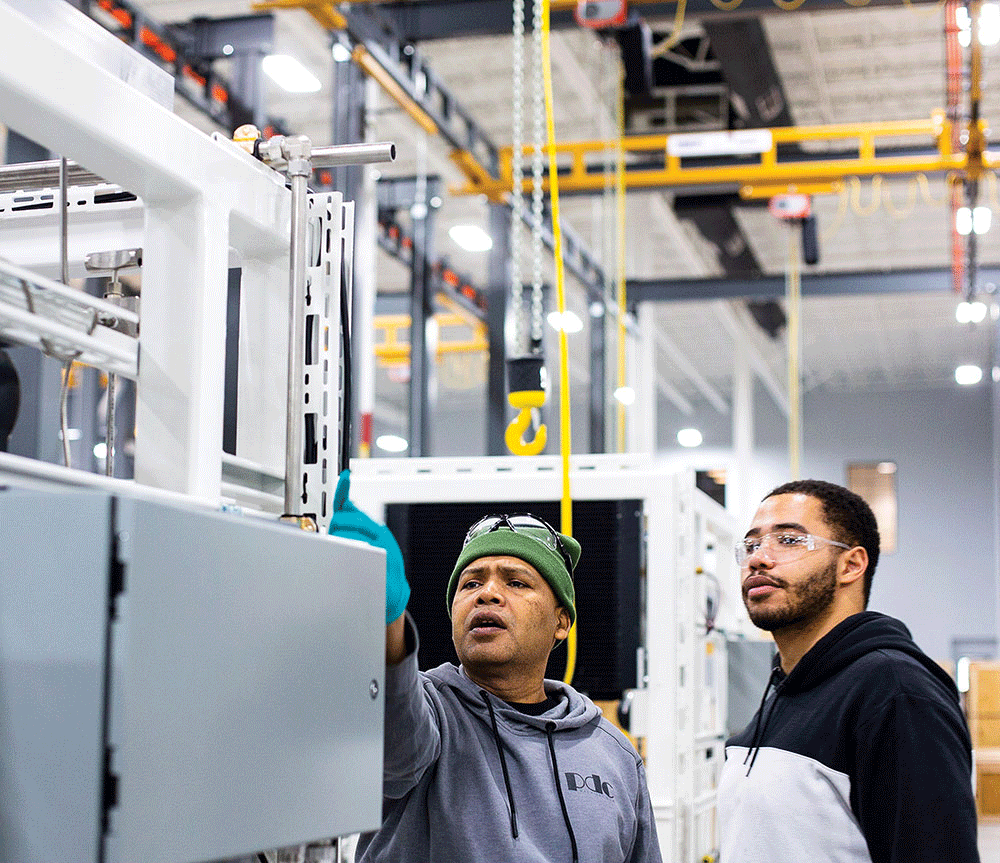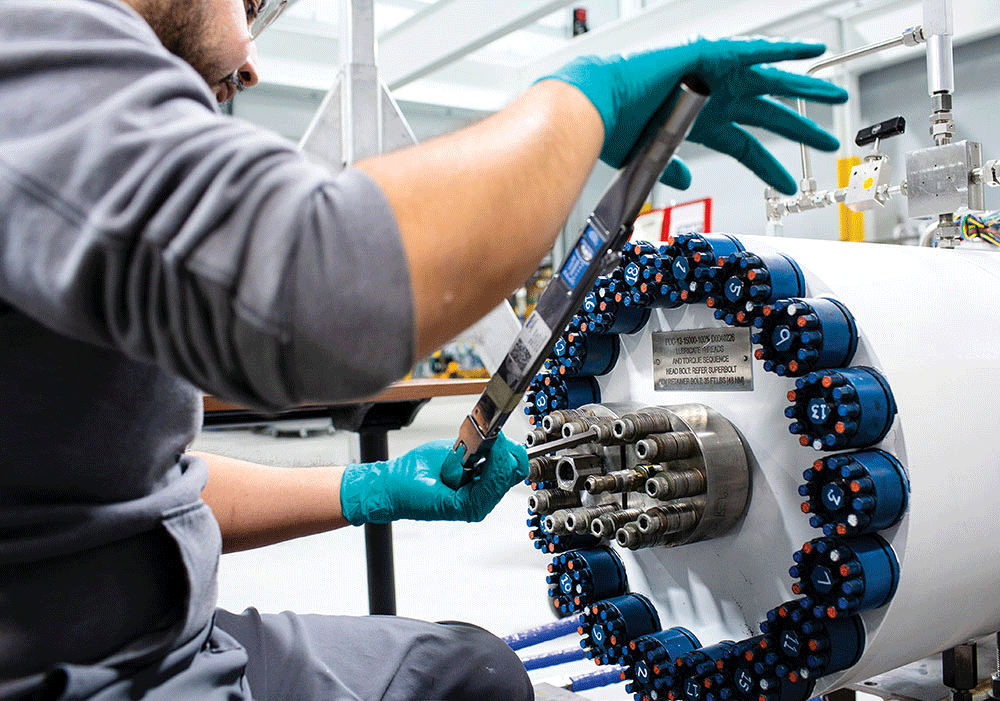Uncharted Territory in Pennsylvania
New collaborative looks to reduce emissions and identify new energy sources.

As the second-largest producer of energy in the U.S., Pennsylvania has played a pivotal role across three energy revolutions – coal, oil and natural gas.
Today, the Keystone State is at the forefront of a new energy transition – the cutting edge of hydrogen and carbon capture, utilization and storage (CCUS).
CCUS involves the use of technologies to capture carbon dioxide (CO2) emissions from industrial processes or the combustion of fuels in power generation. The captured CO2 is then either used on-site as production feedstock, transported elsewhere for use in other applications or stored underground.

New Energy
Hydrogen, often discussed hand-in-hand with CCUS, can be utilized for a wide range of uses, including many industrial processes powering fuel cells and as a fuel to supplement or replace CO2-emitting fuels used for electricity generation. When produced with zero- or low-carbon technology, hydrogen can play a key role in meeting the decarbonization goals of multiple sectors of the economy.
Further, development of hydrogen technology would result in significant job creation and capital investment into communities.
To help expedite this energy revolution, the Team Pennsylvania Foundation – a public-private partnership for economic growth – introduced the Pennsylvania Energy Horizons Cross-Sector Collaborative. The collaborative is a partnership consisting of leaders from more than 80 organizations, including state agencies, industry, academia and nongovernmental entities to reduce greenhouse gas emissions while accelerating economic growth.
“We believe that Pennsylvania can and will be a leader in the global energy transition, in ways that strengthen our workforce, grow our economy and protect our planet,” says Abby Smith, president and CEO of the Team Pennsylvania Foundation, a public-private partnership created in 1997 to improve the state’s competitiveness and economic prosperity. “Our energy future cannot be addressed by one single company or by government alone – this will require strategic collaboration across the public and private sectors. We’re proud to be bringing together partners to chart a path forward for the commonwealth.”

Powering the Future
One of those partners is PDC Machines, a leading manufacturer of diaphragm compressors and hydrogen refueling stations. The company operates its headquarters from Warminster in the southeast corner of Pennsylvania, not far from Philadelphia.
Opening a new manufacturing facility in Souderton, with 150,000 square feet more space, PDC Machines aims to expand its bandwidth to create alternative energy solutions, while also creating high-quality jobs in an emerging industry.
Epcot Crenshaw Corp. (ECC), a company focused on integrating people, data and resources to create science-based solutions for humanity’s biggest problems, is another partner of the collaborative.
“We primarily focus our energy on the integration and facilitation of industry, government and education across the food-energy-water nexus,” says Charles Satish Smith, CEO and chairman of ECC. “We believe in triple-helix innovation, whereby the intersection of education, industry and government holds the promise of a cleaner, more efficient and prosperous economy for all commonwealth stakeholders.”
Smith says the collaborative plays a role to provide research and data analysis to all participants. Because this is an emerging technology, there are lots of opinions around best practices, and it’s important for participating companies and organizations to take a deep dive to grow their information base.
Partners in the collaborative are afforded a rare chance to reach across sectors and outside of their respective industries to find a fresh perspective. Smith says the collaborative engaged all participants in conversations around their collective past, present and future.
“The spirit of innovation and collaborative thinking grows when people feel involved in the venture, which provides opportunities for collaborators to share their experiences along the path to discovery,” he says.
There are both social and economic benefits to participating in the collaborative. Meeting Pennsylvania’s pledge to reduce greenhouse gas emissions 26% by 2025 and 80% by 2050 requires significant investment in industrial facilities – the source of nearly one-third of all emissions, according to the most recent PA Greenhouse Gas Inventory.
Research firms like ECC buttress industrial companies to support their transition to cleaner production. “The perspectives gained by ECC throughout are invaluable, as we work to enable commercial technologies and infrastructure that creates value,” Smith says. “There is no better economic measure to us than when a stakeholder is doing a job and they feel their best doing that job; this has an impact on the generations that follow.”
Accelerating Growth
The Team Pennsylvania Foundation is a leading public-private partnership working toward a more prosperous future for Pennsylvania. President and CEO Abby Smith talks about the foundation’s work in energy and decarbonization and what’s still to come.

Abby Smith
The energy sector is a large part of Pennsylvania’s economy. What is Team Pennsylvania doing to accelerate growth in this space?
Team Pennsylvania has been convening the Pennsylvania Energy Horizons Cross-Sector Collaborative, a partnership consisting of leaders from more than 80 organizations, including state agencies, industry, academia, labor and nongovernmental entities.
The collaborative is charting a path forward for economy-wide decarbonization and economic competitiveness with a focus on CCUS and hydrogen development opportunities in the commonwealth.
What were some of the accomplishments of the collaborative, and what can people expect moving forward?
We are excited for the opportunities for developing and adopting CCUS and clean hydrogen technologies in Pennsylvania and are eager to educate others about the economic and environmental benefits of decarbonization.
We believe that as a public-private partnership, Team Pennsylvania is in the right position to encourage investments in decarbonization to keep Pennsylvania competitive in energy production and industrial productivity. To that end, we partnered with the Great Plains Institute to create a roadmap for Pennsylvania, highlighting key priorities for the state to meet its climate goals, maintain a competitive edge in energy production and industrial manufacturing, and secure billions of dollars in federal and private investments.
How can people learn more about the collaborative?
You can find out more about the collaborative, the roadmap and how to get involved at pennsylvaniaenergyhorizons.org.
Get to Know Pennsylvania
Want to learn more about living and working in Pennsylvania? Check out the latest edition of Livability Pennsylvania: Work Smart. Live Happy.



